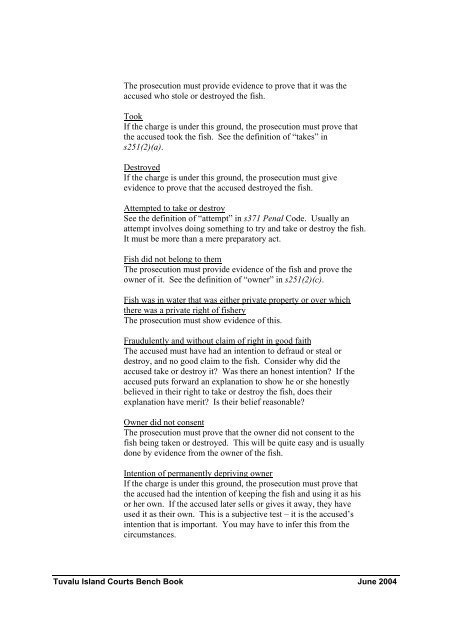Tuvalu Island Courts Bench Book - Federal Court of Australia
Tuvalu Island Courts Bench Book - Federal Court of Australia
Tuvalu Island Courts Bench Book - Federal Court of Australia
Create successful ePaper yourself
Turn your PDF publications into a flip-book with our unique Google optimized e-Paper software.
The prosecution must provide evidence to prove that it was the<br />
accused who stole or destroyed the fish.<br />
Took<br />
If the charge is under this ground, the prosecution must prove that<br />
the accused took the fish. See the definition <strong>of</strong> “takes” in<br />
s251(2)(a).<br />
Destroyed<br />
If the charge is under this ground, the prosecution must give<br />
evidence to prove that the accused destroyed the fish.<br />
Attempted to take or destroy<br />
See the definition <strong>of</strong> “attempt” in s371 Penal Code. Usually an<br />
attempt involves doing something to try and take or destroy the fish.<br />
It must be more than a mere preparatory act.<br />
Fish did not belong to them<br />
The prosecution must provide evidence <strong>of</strong> the fish and prove the<br />
owner <strong>of</strong> it. See the definition <strong>of</strong> “owner” in s251(2)(c).<br />
Fish was in water that was either private property or over which<br />
there was a private right <strong>of</strong> fishery<br />
The prosecution must show evidence <strong>of</strong> this.<br />
Fraudulently and without claim <strong>of</strong> right in good faith<br />
The accused must have had an intention to defraud or steal or<br />
destroy, and no good claim to the fish. Consider why did the<br />
accused take or destroy it? Was there an honest intention? If the<br />
accused puts forward an explanation to show he or she honestly<br />
believed in their right to take or destroy the fish, does their<br />
explanation have merit? Is their belief reasonable?<br />
Owner did not consent<br />
The prosecution must prove that the owner did not consent to the<br />
fish being taken or destroyed. This will be quite easy and is usually<br />
done by evidence from the owner <strong>of</strong> the fish.<br />
Intention <strong>of</strong> permanently depriving owner<br />
If the charge is under this ground, the prosecution must prove that<br />
the accused had the intention <strong>of</strong> keeping the fish and using it as his<br />
or her own. If the accused later sells or gives it away, they have<br />
used it as their own. This is a subjective test – it is the accused’s<br />
intention that is important. You may have to infer this from the<br />
circumstances.<br />
<strong>Tuvalu</strong> <strong>Island</strong> <strong><strong>Court</strong>s</strong> <strong>Bench</strong> <strong>Book</strong> June 2004
















